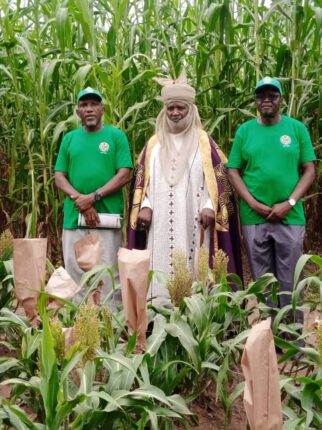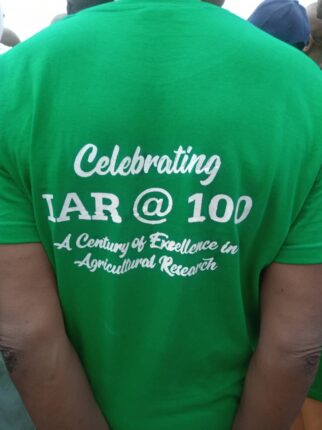By Auwalu Umar
Ahmadu Bello University’s Institute for Agricultural Research (IAR) turned 100 years in 2022 having been founded in 1922.
The institute was to celebrate its centenary anniversary last year but for the long industrial dispute arising from the eight-month strike by the Academic Staff Union of Universities (ASUU).
The institute, at last, flagged off the celebrations with a tree-planting campaign on Wednesday, 13th September, 2023, an event, where the Vice-Chancellor, Prof. Kabiru Bala, led other management staff of the institute, including IAR’s Executive Director, Prof. Mohammad Faguji Ishiyaku, to plant various species of trees. The Vice-Chancellor planted tamarind at a green area at the premises of the institute to symbolize longevity as the tree could live for 1,000 years.
When the institute was established in 1922 first as an Agricultural Station as well as an Administrative Headquarters of the then Northern Region of Nigeria’s Department of Agriculture, little was envisaged that the agricultural office would blossom into a foremost agricultural research institute in Nigeria and beyond.

Historically, research in IAR started formally in 1925 with the establishment of a biological laboratory and the arrival of a botanist and a chemist as researchers. And significantly, the Second World War engendered interest in the production of chili pepper and onion by the Agricultural Department, experimented by the School of Agriculture. This was not without purpose; it was to aid the war effort. Chili pepper and onions, for instance, were used in the production of tear gas used in the war front against Nazi Germany.
Remarkably, after the eventual takeover of Ahmadu Bello University, Zaria by the Federal Government in 1975, IAR was formally transferred and affiliated to the University in accordance with Statute 14 of the University Act.
Read Also: How to reset Nigeria’s economy – Khalifa Sanusi
Again, by 1987, following re-organization of research institutes under the Federal Ministry of Agriculture and Rural Development, IAR’s initial crop research mandate which covered all crops, including vegetables such as Irish potatoes, tomatoes, cabbage, rice, millet, and others, was restricted to genetic improvement of sorghum, maize, groundnut, cotton, cowpea, sunflower, and later castor and jatropha.

Profound and humbling as it is, IAR’s research output today has culminated in the release of over 200 improved crop varieties for agricultural development and improvement of farmers’ lot for enhanced access to food by Nigerians.
To this end, IAR has, in the last 50 years, so far, developed and released improved varieties of 21 cowpea, 29 groundnut, 69 maize, 56 sorghum, 4 sunflowers, 17 cotton, 7 millet, 5 wheat, 12 tomato, 3 soyabean, 2 sesame and oats. The effort has been steady. For example, national potential yield of maze has increased from less than 2t/ha to up to 9t/ha, sorghum from less than 1t/ha to 2.5t/ha, and cowpea 0.5t/ha to 2.7t/ha.
Significantly, some of the institute’s technologies have traversed beyond Nigeria, as they are readily found in West and Central Africa sub-regions. For instance, its groundnut and cowpea varieties are widely grown by farmers across Niger Republic, Mali, and Cameroon. The institute’s other technologies include improved irrigation approaches for economizing water in dry season production, as well as a selection of suitable crops and their varieties for irrigation. This is beside the investment in research to develop new food products suitable for today’s consumer preferences.

Read Also: NAFDAC destroys fake, expired goods worth N500m
Going forward, IAR should continue on the pathways of consolidation. Having attained 100 years of existence as a foremost and formidable research institute, IAR can now set for itself directions for its future. For example, it can, among many others, focus on developing and promoting climate-smart agricultural practices that can enhance resilience to climate change. Research efforts can also be directed towards developing food and drought-tolerant crop varieties, sustainable management techniques, and climate-resilient farming systems.
The institute must embrace emerging digital technologies such as precision agriculture, remote sensing, and data analytics which can revolutionize farming practices. It can explore the use of these technologies to optimize resource use, improve crop monitoring, and enhance decision-making for farmers. Equally, IAR can play a key role in strengthening agricultural value chains by focusing on post-harvest value chains by focusing on post-harvest management, processing, and market linkages. Research can be conducted to develop efficient storage and processing techniques, promote value-added products, and facilitate market access for farmers.
The institute rounded off its centenary celebrations with a public lecture, book launch, and awards presentation. The celebrations were coming only two years after IAR won a special award as the most outstanding institute with a ‘Major Breakthrough in Research/Results’ in Nigeria. The award, ‘Productivity Specialised Award’, was presented to the institute on Thursday, 14th October 2021 by the Federal Ministry of Agriculture and Rural Development in collaboration with the Food and Agriculture Organisation (FAO).
The high point of the celebrations was the awards presentation of a posthumous award to Alhaji Hassan Lemu, the Principal Private Secretary to the Premier of Northern Nigeria Sir Ahmadu Bello, for vehemently supporting the transfer or affiliation of all research institutes in the North to the newly established University of the North, later called Ahmadu Bello University, Zaria. Lemu argued that staff availability, teaching, and research needs of both the institute staff and students would be better-taken care of. This was against the wish of the British colonialists who argued that the affiliation would be counterproductive by derailing the vision of the institute and creating a bureaucratic bottleneck, as well as underfunding which could impair its smooth functions.
The centenary public lecture, ‘Agricultural Research, Technology, and Innovation as Catalysts for National Development: Impact on Poverty, Food and Economy Security in Nigeria in the 21st Century”, was given by former Minister of State for Agriculture and Rural Development, and Secretary to the Borno State Government, Malam Bukar Tijjani. The lecture dwelled on the pivotal role that agricultural research, technology, and innovation played in Nigeria’s social, economic, and political landscape.
The minister, particularly, acknowledged the central role played by IAR in alleviating poverty, especially in its original mandate in the Savannah ecology which covers Nigeria’s approximately 600,000 square kilometers out of the 924,000 square kilometers of total land area. He clearly pointed out that the institute had ensured food security, nutrition for all, and strengthened Nigeria’s economic growth and agricultural development at the early stages of its establishment and well into the 1970s.
Read Also: FCDA denies purported demolition of National Mosque
Happily, the Vice-Chancellor, Ahmadu Bello University, Prof. Kabiru Bala, commended the IAR’s outgoing Executive Director, Prof. Muhammad Faguji Ishiyaku and other management staff of the institute for the remarkable organisation of the centenary celebrations in the face of scarcity of funds. Bala, who noted that the history of ABU would be incomplete without IAR, urged the Federal Government to adopt the IAR and ABU Faculty of Agriculture model of research and teaching by introducing the research and teaching component to all tertiary institutions, especially the universities, for effective learning by students.
Umar is Director, Public Affairs Directorate, Ahmadu Bello University, Zaria.



Comments are closed.